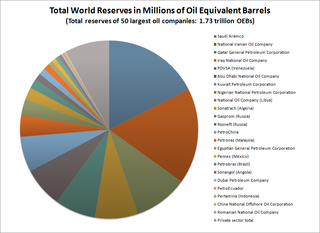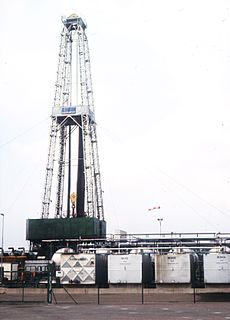
Petroleum is a naturally occurring, yellowish-black liquid found in geological formations beneath the Earth's surface. It is commonly refined into various types of fuels. Components of petroleum are separated using a technique called fractional distillation, i.e. separation of a liquid mixture into fractions differing in boiling point by means of distillation, typically using a fractionating column.

Petroleum engineering is a field of engineering concerned with the activities related to the production of hydrocarbons, which can be either crude oil or natural gas. Exploration and production are deemed to fall within the upstream sector of the oil and gas industry. Exploration, by earth scientists, and petroleum engineering are the oil and gas industry's two main subsurface disciplines, which focus on maximizing economic recovery of hydrocarbons from subsurface reservoirs. Petroleum geology and geophysics focus on provision of a static description of the hydrocarbon reservoir rock, while petroleum engineering focuses on estimation of the recoverable volume of this resource using a detailed understanding of the physical behavior of oil, water and gas within porous rock at very high pressure.

Oil refinery or petroleum refinery is an industrial process plant where crude oil is transformed and refined into more useful products such as petroleum naphtha, gasoline, diesel fuel, asphalt base, heating oil, kerosene, liquefied petroleum gas, jet fuel and fuel oils. Petrochemicals feed stock like ethylene and propylene can also be produced directly by cracking crude oil without the need of using refined products of crude oil such as naphtha.

North Sea oil is a mixture of hydrocarbons, comprising liquid petroleum and natural gas, produced from petroleum reservoirs beneath the North Sea.

The petroleum industry, also known as the oil industry or the oil patch, includes the global processes of exploration, extraction, refining, transporting, and marketing of petroleum products. The largest volume products of the industry are fuel oil and gasoline (petrol). Petroleum (oil) is also the raw material for many chemical products, including pharmaceuticals, solvents, fertilizers, pesticides, synthetic fragrances, and plastics. The extreme monetary value of oil and its products has led to it being known as "black gold". The industry is usually divided into three major components: upstream, midstream, and downstream.

The Society of Petroleum Engineers (SPE) is a 501(c)(3) not-for-profit professional organization whose mission is to collect, disseminate, and exchange technical knowledge concerning the exploration, development and production of oil and gas resources and related technologies for the public benefit and to provide opportunities for professionals to enhance their technical and professional competence.
The oil and gas industry is usually divided into three major sectors: upstream, midstream, and downstream. The downstream sector is the refining of petroleum crude oil and the processing and purifying of raw natural gas, as well as the marketing and distribution of products derived from crude oil and natural gas. The downstream sector reaches consumers through products such as gasoline or petrol, kerosene, jet fuel, diesel oil, heating oil, fuel oils, lubricants, waxes, asphalt, natural gas, and liquefied petroleum gas (LPG) as well as hundreds of petrochemicals.

Oil reserves denote the amount of crude oil that can be technically recovered at a cost that is financially feasible at the present price of oil. Hence reserves will change with the price, unlike oil resources, which include all oil that can be technically recovered at any price. Reserves may be for a well, a reservoir, a field, a nation, or the world. Different classifications of reserves are related to their degree of certainty.

The China National Petroleum Corporation (CNPC) is a major national oil and gas corporation of China PR and one of the largest integrated energy groups in the world. Its headquarters are in Dongcheng District, Beijing. CNPC was ranked fourth in 2017 Fortune Global 500, a global ranking of the largest corporations by revenue.

A petroleum reservoir or oil and gas reservoir is a subsurface pool of hydrocarbons contained in porous or fractured rock formations. Petroleum reservoirs are broadly classified as conventional and unconventional reservoirs. In case of conventional reservoirs, the naturally occurring hydrocarbons, such as crude oil or natural gas, are trapped by overlying rock formations with lower permeability. While in unconventional reservoirs the rocks have high porosity and low permeability which keeps the hydrocarbons trapped in place, therefore not requiring a cap rock. Reservoirs are found using hydrocarbon exploration methods.

The Abu Dhabi National Oil Company or ADNOC is the state-owned oil company of the United Arab Emirates (UAE). According to the Oil & Gas Journal, as of January 2015, the UAE holds the seventh-largest proven reserves of oil in the world at 97.8 billion barrels. Most of these reserves are located in Abu Dhabi. It is the world's 12th largest oil company by production, producing 3.1 million barrels per day. It is the UAE's biggest company.
The Ministry of Petroleum and Natural Gas (MOP&NG) is a ministry of the Government of India. It is responsible for the exploration, production, refining, distribution, marketing, import, export, and conservation of petroleum, natural gas, petroleum products, and liquefied natural gas in India.

The petroleum industry of Ghana is regulated by the state-owned Ghana National Petroleum Corporation (GNPC) and administered by the state-owned Ghana Oil Company (GOIL).

Desire Petroleum plc was an oil and gas exploration company headquartered in Malvern, England. It owned offshore exploration and production licences in the North Falkland Basin in the waters north of the Falkland Islands and its core focus was to develop the basin into a major new hydrocarbon province.
Bangladesh is the nineteenth-largest producer of natural gas in Asia. Gas supplies meet 56% of domestic energy demand. However, the country faces an acute energy crisis in meeting the demands of its vast and growing population. Bangladesh is a net importer of crude oil and petroleum products. The energy sector is dominated by state-owned companies, including Petrobangla and the Bangladesh Petroleum Corporation. Chevron, ConocoPhilips, Statoil, Gazprom and ONGC are major international companies engaged in Bangladesh's hydrocarbon industry, with Chevron's gas fields accounting for 50% of natural gas production.

Indian Oil Corporation Limited (IOCL), commonly known as IndianOil is an Indian state owned oil and gas company with registered office at Mumbai and primarily headquartered in New Delhi. It is the largest commercial oil company in the country, with a net profit of INR 19,106 crore for the financial year 2016–17. It is ranked 1st in Fortune India 500 list for year 2016 and 168th in Fortune's ‘Global 500’ list of world's largest companies in the year 2017. As of 31 March 2017 IndianOil's employee strength is 33,135, out of which 16,545 are in the officer cadre. It is India's largest downstream oil company, with a work force of more than 33,000 employees, a turnover of Rs. 506,428 crore and a net profit of Rs. 21,346 crore in 2017-18.
Institute of Petroleum Studies Kampala, IPSK, is a privately owned institution that offers training and instruction in the field of petroleum exploration, recovery, refinement and responsible utilization in Uganda.














